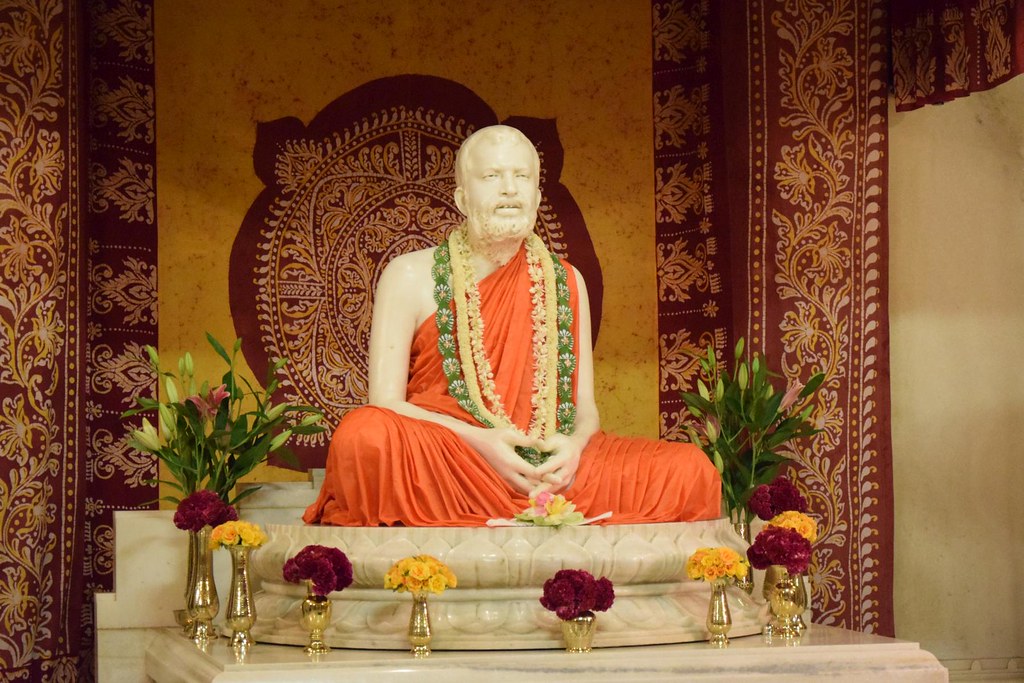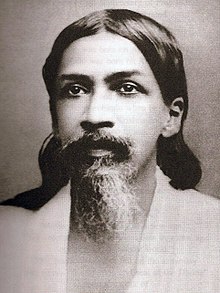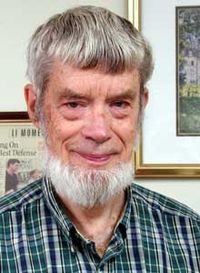—The First Centenary Celebration of Sri Ramakrishna’s Birth
(Continued from the previous issue. . .)
The following article, of much archival and documentary significance, is based on a recorded talk given in the early 1960s by late Swami Sambuddhananda (1891-1974) at the Vedanta Society of Hawaii in Honolulu, USA. Swami Sambuddhananda was a disciple of Holy Mother Sri Sarada Devi. He was appointed a Trustee of Ramakrishna Math and Mission in 1947 and had the distinction of playing a pivotal role in organizing the Centenary Celebrations of Sri Ramakrishna in 1936 and Swami Vivekananda in 1963. This very interesting and informative talk has been thoroughly edited by Swami Bhaskarananda, the Head of Vedanta Society of Seattle, USA. It was first published in Global Vedanta, the English quarterly published from there. We are grateful to the Editorial Board of Global Vedanta for permitting us to reproduce it here.
As the work progressed according to the programme already chalked out for the Centenary Celebration [in 1936], we had to prepare for a Parliament of Religions. And it was decided that the Parliament of Religions would be held for seven days, and it would have 14 sessions. The Town Hall of Calcutta, which could hold an audience of 2,500, was chosen to be the venue of the Parliament. Had the sessions been left open to the public, the rush of attendees would be so great that it would be impossible for us to accommodate them in that hall. That’s why we decided that one would have to buy tickets to attend the sessions. Every day there were two sessions— one in the morning and one in the evening. And the attendance at the evening sessions was very large. The hall would be packed with 2,500 people every evening. As people had to go to work in the morning, only a few hundred attended the morning sessions, except on Sunday when we had a full house.
In the evening sessions various famous speakers and dignitaries, not only from India, but also from Europe and America, would give their talks or read their papers. In this manner, the Parliament of Religions was conducted.
But the first requirement, according to the programme of the Centenary Celebration, was that a message of the President of the General Committee of the Centenary should be broadcast all over the world. But how to secure the message of the President, who was no other than Swami Akhandananda, was a great problem, considering the fact that the Swami was dead against holding the birth-centenary of Sri Ramakrishna.
All the brother disciples of Swami Vivekananda loved him so much that anyone who was a friend or disciple of the great Swami was also very dear to them. Miss MacLeod figured very highly as an ardent admirer and friend of Swami Vivekananda. At that time she was staying at Belur Math.
When she heard about this problem, she came forward and wanted to help us out. She thought that if she went to Swami Akhandananda, who was at that time staying in our Sargachhi Ashrama, at a distance of nearly 100 miles from Belur Math, she would be able to persuade him to give a message for the Centenary. So she hired for herself an entire railroad coach, known in Indian Railways as the saloon car. A saloon car is like a self-contained house on wheels with bathroom, kitchen facilities, etc. That saloon car was attached to the ‘mail’ train for Behrampore. With Miss Macleod, her servant and also her cook went by the saloon car. The train on its way to its destination would pass through Sargachhi railroad station, where Miss MacLeod’s saloon car would be detached from the train. It would be reattached again when the same train would head back toward Calcutta from Behrampore some twelve hours later.
When she went to see Swami Akhandananda he was naturally overjoyed at her surprise visit. Then the Swami heartily welcomed her and took her around the Ashrama and happily showed her the garden, different kinds of flowering plants, fruit trees, etc. At last they came back to the covered porch of the Ashrama building where the Swami usually would grant audiences to people. Both Miss MacLeod and the Swami sat there. Then by way of conversation she skillfully raised the topic of the Centenary Celebration. In so many words Swami Akhandananda expressed his strong disapproval of the very idea of celebrating the birth-centenary of Sri Ramakrishna. Miss MacLeod had taken with her some note sheets and recorded on them whatever the Swami said.
Then she took leave of the Swami, and came back to her saloon car. There she finished her bath, worship and lunch, and then took rest. In the evening she had her supper and waited for the mail train to come around 9 or 10 pm, attach her saloon car to itself and speed toward Calcutta. Next morning she came back to Belur Math and submitted those note sheets to Swami Shuddhananda, another disciple of Swami Vivekananda, as well as a very highly respected senior Swami [and later President] of the Ramakrishna Order. He was also the Secretary of both the General Committee as well as the Working Committee of the Sri Ramakrishna’s Birth-Centenary Celebration. Swami Shuddhananda called me and said, ‘Well, Sambuddhananda, Miss MacLeod went to secure the message of our President at Sargachhi, and these are the papers that she has brought, you may read them.
’ I asked him, ‘Maharaj,4 haven’t you read them yet?’
He said, ‘Yes, I’ve read them.’
Then I said to him, ‘In that case, I don’t see any necessity for me to go through them again. Will you please tell me what these papers contain?’
Then the Swami replied, ‘I have gone through all the six pages of her note sheets, but I couldn’t find a single sentence which could be used as a message from our President to the whole world.’
Now what would you do? He wanted my suggestion, so I told him, ‘In that case, it is better to substitute our President’s message with some suitable comments of Swami Vivekananda about Sri Ramakrishna.’
He accepted my suggestion and asked, ‘Can you tell me where such comments occur?’
I told him, ‘No, I can only say that these must be somewhere in The Complete Works of Swami Vivekananda.’ The Complete Works has over eight volumes, how could I remember where those comments were!
The Swami at once asked one of the junior monks to bring a certain volume of the third edition of the book. And as soon as the book had been brought, he told that monk, ‘Well, open to page 264.’ Then he asked the monk to open another page. I was simply astounded by seeing Swami Shuddhananda’s wonderful memory power! Among the eight volumes, the pages that he had pointed out contained the lecture and the passage where we found the comments that we had been looking for. An amazing feat indeed!
Swami Vivekananda’s comments were presented at the Committee meeting. Some members wanted to omit a few words from Swami Vivekananda’s comments, because they thought that they could be interpreted as seditious by the British Government. But I said that we must not omit even a single word from Swami Vivekananda’s comments. I argued that had those words been seditious the British Government would already have proscribed them.
So nothing was omitted and we decided to send that message to many different places in Asia, Europe and America. We hardly had one day left for sending the message of Swami Vivekananda to those places, because any more delay would only mean that the message would not reach the destinations before their Centenary Celebrations. So we all worked feverishly day and night. But by the time we had made the letters enclosing that message ready for dispatch and went to the post office, they told us that the mailbags had already been sealed.
Luckily, one of the volunteers at our Centenary office was a retired Assistant Post Master General of the Government of India. So I caught hold of him and requested him to see if he could do anything about it.
He went to the General Post Office of Calcutta and threw his entire weight as the retired Assistant Post Master General, and was thus able to persuade his successor to reopen those mailbags and put all our letters in them. After the bags had been re-sealed and dispatched to the airport he came back to us and gave that good news.
After two or three days, by the time the dispatched letters had reached their destinations, a messenger arrived from the Sargacchi Ashrama carrying a letter from our President, Swami Akhandananda. It contained the Swami’s message for the Centenary! Swami Shuddhananda then called me and said, ‘Well, Sambuddhananda, at last our President has sent his message.’
I said to him, ‘Maharaj4, I hope you have gone through it.’
He replied, ‘Yes.’
‘How do you find it?’ I asked.
‘He knows how to write, and he has written quite well.’
The letter was written in Bengali. With only two days left before the Centenary Celebration would commence all over the world, we had another difficult problem to solve. We would have to translate his nearly 300-word long message into English and send it to all those different places in Asia, Europe and America by cablegram in a day! How that problem was resolved is another interesting story.
(To be continued . . .)
References :
4. In the Ramakrishna Order tradition, monks are addressed by using the word ‘Maharaj’.
What Religion Does for Man Well has it been said that man is the only animal that naturally looks upwards; every other animal naturally looks down. That looking upward and going upward and seeking perfection are what is called salvation; and the sooner a man begins to go higher, the sooner he raises himself towards this idea of truth as salvation. It does not consist in the amount of money in your pocket, or the dress you wear, or the house you live in, but in the wealth of spiritual thought in your brain. That is what makes for human progress, that is the source of all material and intellectual progress, the motive power behind, the enthusiasm that pushes mankind forward. Religion does not live on bread, does not dwell in a house. Again and again you hear this objection advanced: ‘What good can religion do? Can it take away the poverty of the poor?’ Supposing it cannot, would that prove the untruth of religion? Suppose a baby stands up among you when you are trying to demonstrate an astronomical theorem, and says, ‘Does it bring gingerbread?’ ‘No, it does not’, you answer. ‘Then’, says the baby, ‘it is useless.’ Babies judge the whole universe from their own standpoint, that of producing gingerbread, and so do the babies of the world. We must not judge of higher things from a low standpoint. Everything must be judged by its own standard and the infinite must be judged by the standard of infinity. Religion permeates the whole of man’s life, not only the present, but the past, present, and future. It is, therefore, the eternal relation between the eternal soul and the eternal God.
—Swami Vivekananda, CW, 3:4
Source : Vedanta Kesari, April, 2015


